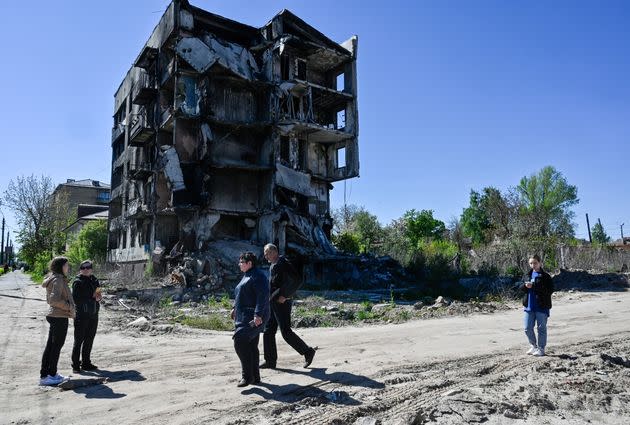Russia 'Targeting Mosques And Immigration Centres' To Hit Army Recruitment Target, Says UK

People walk past an apartment building destroyed by the Russian army in the city of Borodyanka, north west Kyiv.
Russia is having to entice Asian migrant workers with big-money bonuses and fast-track citizenship in an attempt to hit its recruitment target for the war in Ukraine, according to UK intelligence.
Mosques and immigration centres are being targeted as part of the mass sign-up drive, the Ministry of Defence (MoD) said.
They said the Kremlin wants to recruit 400,000 volunteers to send to the front line, but is wary of provoking “domestic dissent” by introducing mandatory mobilisation.
Details of the recruitment campaign were revealed in the MoD’s latest intelligence update on the war.
It said that immigrants agreeing to join the Russian war effort are receiving bonuses of up to $2,390 and salaries of $4,160 a month.
They are also being offered the chance to become Russian citizens in just six months, rather than the usual five years, if they agree to fight on the front line.
“Recruiting migrants is part of the Russian Ministry of Defence’s attempts to fulfil its target of 400,000 volunteers to fight in Ukraine,” the UK said.
“The authorities are almost certainly seeking to delay any new overt mandatory mobilisation for as long as possible to minimise domestic dissent.”
Latest Defence Intelligence update on the situation in Ukraine - 8 May 2023.
Find out more about Defence Intelligence's use of language: https://t.co/q3q2D3qfib
🇺🇦 #StandWithUkraine 🇺🇦 pic.twitter.com/fEVdSbv4Kq— Ministry of Defence 🇬🇧 (@DefenceHQ) May 8, 2023
Meanewhile, the MoD also revealed that Russia is facing its “worst labour shortage in decades” as a result of the war in Ukraine and the Covid-19 pandemic.
Russia’s population has reportedly decreased by two million more people than expected, the MoD said, with 1.3 million leaving the country in 2022 alone.
“Mobilisation, historically high emigration, and an ageing and shrinking population is limiting the labour supply,” they said.
“This will likely lead to a reduction in the potential growth of the Russian economy and risks stoking inflation.”
Related...
Ukrainian Official Punches Russian Representative At Turkish Summit
What We Know So Far About The Alleged Attack On Putin And The Kremlin
Russia Does Not Have Enough Weapons For A Successful Ukraine Offensive, UK Says

 Yahoo News
Yahoo News 